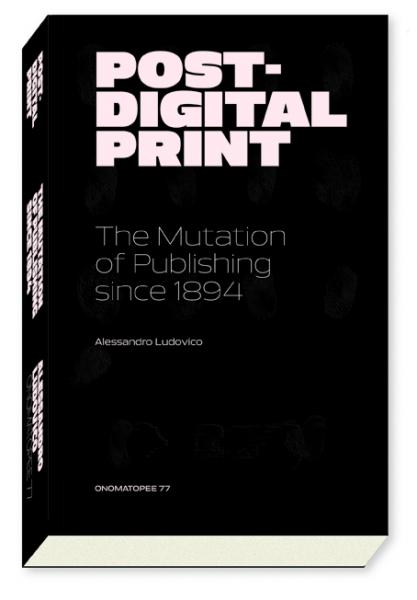Alessandro Ludovico: Post-Digital Print: The Mutation of Publishing Since 1894 (2012–) [EN, IT]
Filed under book | Tags: · archive, book, e-book, filesharing, library, networks, print, publishing, reading, text, writing

“In the post-digital age, digital technology is no longer revolutionary but a normality, everywhere. For music or film, circulation as bits and bytes, downloads and streams are no longer a big deal. But for the world of book and magazine publishing, change has just begun.
New ways of networked and electronic publishing had been envisioned by avant-garde artists, activists and technologists for more than a century. Even though in hindsight the reports of the death of paper were greatly exaggerated, electronic publishing has now become a reality. How will analog and digital coexist in the post-digital age of publishing? How will they transition, mix and cross over?
In this book, Alessandro Ludovico rereads the history of avant-garde arts as a prehistory of cutting through the opposites of paper and electronics. He covers, among others, artists’ books and manifests, zines, net art and experimental publishing projects, up to e-readers and print-on-demand.”
With Afterword by Florian Cramer
Publisher Creating 010, Hogeschool Rotterdam & Onomatopee, Eindhoven, May 2012
Onomatopee 77: Cabinet Project
Creative Commons Attribution-NonCommercial-ShareAlike 3.0 Unported License
ISBN 9789078454878, 9078454873
192 pages
via Florian Cramer
Interview with author: Teresa de Andrés (VisualMag, 2012).
Reviews: Franz Thalmair (Springerin, 2012), Regine Debatty (We Make Money Not Art, 2013), Rob Myers (Furtherfield, 2013), Paul Prudence (Neural, 2013), brnrd.net (2013), Kate Cunningham (Yapp, 2014), Eloïse Cariou (Critique d’art, 2016, FR), Benjamin Caraco (BBF, 2017, FR).
Book launch (Eindhoven, 2012)
Post Digital Print (series of activities around the publication, 2012)
Book website
Publisher (EN)
Publisher (IT, archived)
WorldCat (EN)
Wikipedia
Post-Digital Print (English, 2012, updated on 2012-5-31 to the latest version of the book, Internet Archive)
Post-digital print. La mutazione dell’editoria dal 1894 (Italian, trans. Alessandro Ludovico and Rosa Antonicelli Verrelli, 2014, added on 2020-6-3)
Walter J. Ong: Orality and Literacy: The Technologizing of the Word (1982–)
Filed under book | Tags: · alphabet, language, literature, logocentrism, media history, oral culture, poetry, print, rhetoric, technology, text, writing

This classic work explores the vast differences between oral and literate cultures offering a very clear account of the intellectual, literary and social effects of writing, print and electronic technology.
In the course of his study, Walter J. Ong offers fascinating insights into oral genres across the globe and through time, and examines the rise of abstract philosophical and scientific thinking. He considers the impact of orality-literacy studies not only on literary criticism and theory but on our very understanding of what it is to be a human being, conscious of self and other.
First published in 1982 by Methuen & Co. Ltd
Publisher Routledge, 2002
New Accents series
ISBN 0415281296, 9780415281294
204 pages
PDF (1982/2002, updated on 2014-11-23)
Comment (0)Charles Bazerman: Shaping Written Knowledge: The Genre and Activity of the Experimental Article in Science (1988)
Filed under book | Tags: · epistemology, history of science, knowledge production, linguistics, literature, physics, rhetorics, science, semiotics, social science, spectroscopy, theory, writing

The immense force of scientific knowledge in our world has in recent years commanded the attention of a number of scholarly disciplines, ranging from the history of science to literary theory, from philosophy to the teaching of writing. Each foray into the language of science, however, has been motivated by the discipline and school of the researcher. Shaping Written Knowledge confronts scientific language more directly, by making its special character the real center of the inquiry. Original and extensive, this work will be of great interest to scholars concerned with the sociology and history of science, language theory, the history of literacy, the rhetoric of knowledge, technical writing, and the teaching of composition.
The emergence of the experimental article in science, Bazerman shows, is a response to the social and rhetorical situation of seventeenth- and eighteenth-century natural philosophy activated by the need to communicate findings and the exigencies of conflict that arise from communication. The appearance of the argumentative forms of scientific writing are coincident with the rise of the scientific community and the development of experimental procedures. All three interactively structure each other. Bazerman shows that later developments of the experimental article, in both the physical and social sciences of the twentieth century, have been made within the contexts of various disciplines. An understanding of what forces have shaped the experimental report, what functions the features were designed to serve, and the impact of rhetoric on the rest of scientific activity help to evaluate all statements of knowledge and increase our ability to make intelligent writing choices.
Edited for digital presentation by Patricia Klei
Publisher University of Wisconsin Press, Madison, Wisconsin, 1988
ISBN 0299116905, 9780299116903
356 pages
publisher
ebook publisher
google books
PDF (updated on 2012-6-13)
PDF (alt)

